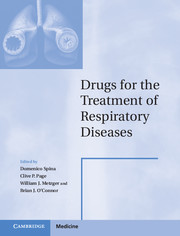Book contents
- Frontmatter
- Contents
- List of contributors
- Preface
- Part I Asthma and COPD
- Part II Diffuse parenchymal lung disease
- Part III Infection
- Part IV Pulmonary vascular diseases
- 17 Pathophysiology of pulmonary vascular disease
- 18 Current treatment of pulmonary vascular diseases
- 19 Future treatment of pulmonary vascular diseases
- Part V Lung cancer
- Part VI Cough
- Index
17 - Pathophysiology of pulmonary vascular disease
from Part IV - Pulmonary vascular diseases
Published online by Cambridge University Press: 15 August 2009
- Frontmatter
- Contents
- List of contributors
- Preface
- Part I Asthma and COPD
- Part II Diffuse parenchymal lung disease
- Part III Infection
- Part IV Pulmonary vascular diseases
- 17 Pathophysiology of pulmonary vascular disease
- 18 Current treatment of pulmonary vascular diseases
- 19 Future treatment of pulmonary vascular diseases
- Part V Lung cancer
- Part VI Cough
- Index
Summary
Introduction
Primary disorders of the pulmonary vasculature are decidedly uncommon. However, secondary involvement of pulmonary blood vessels is very common, being a feature or a complication of many cardiac, pulmonary and other medical conditions. Although we understand more about diseases of the pulmonary blood vessels than just a few decades ago, there is still much less known about the pulmonary vessels than about the systemic blood vessels. However, the presence of similar types of cells in both systemic and pulmonary vessels and a limited range of pathological responses to injury permit students of both to learn from each other.
In this chapter, we will review our understanding of the pathogenesis and pathophysiology of pulmonary vascular disease (PVD). PVD may be primary (idiopathic) or secondary to an underlying medical disorder, especially of the heart and lungs. We will focus on one particular entity, primary pulmonary hypertension (PPH) as a prototypical human example of PVD. Although there is much overlap between proposed mechanisms of pulmonary vascular injury in PPH and in secondary PVD, significant clinical and biological heterogeneity exists. Thus, wherever possible, hypothesized mechanisms will be presented with representative, supporting data from studies of patients with PPH. When no such data exist, we will present data from other clinical disorders of PVD, e.g. congenital heart disease (CHD)-associated pulmonary arterial hypertension (PAH), as well as from studies using various animal models of PVD.
- Type
- Chapter
- Information
- Drugs for the Treatment of Respiratory Diseases , pp. 453 - 474Publisher: Cambridge University PressPrint publication year: 2003



